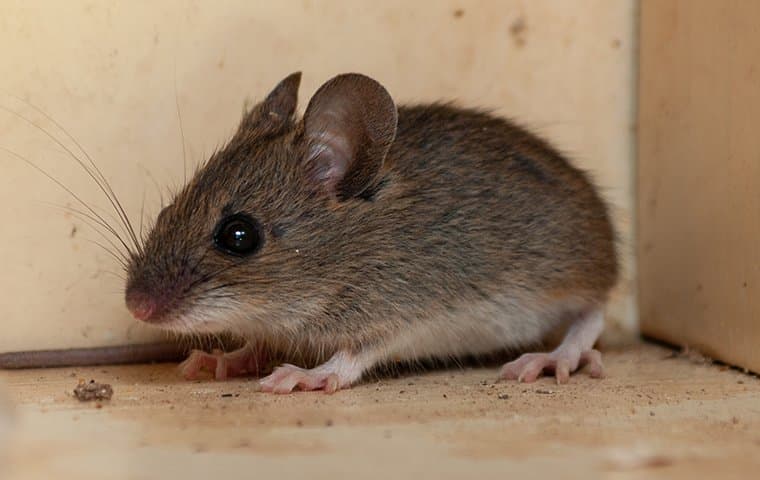
If you could see into the life of a mouse, what would it look like? Well, you can't go by what you've seen in cartoons. That much is for sure. Mice don't live in cozy little homes within your walls—or do they? While they don't have little beds or rocky chairs, mice actually do live inside your walls. They collect materials from around your home to make soft nests within voids. Your walls remind mice of their natural habitats inside tree cavities. The more you understand about how mice behave, the greater your chances of controlling mouse problems.
Join us as we cover everything you should know about Hattiesburg mice. We'll explain what house mice are and what they do when they infiltrate your home. We'll also go over how to get rid of mice in your walls. If you need mouse control in Hattiesburg, we're happy to help. Your Havard Pest Control team has the training to handle mouse control issues. Contact us for fast service and effective results.
Identifying The Common Mouse: Differentiating Mice From Other Rodents
What exactly is a house mouse, and how is it different from other rodents? First, the house mouse is Mus musculus, a species particularly fond of living inside houses. It is the worst of all rodents. Let's look at why.
The house mouse is the most common indoor mouse. Many house mice never see the outdoors. They live their entire lives sheltered from the dangers of outdoor living. A common mouse that doesn't like living indoors is the deer mouse. You can identify the deer mouse by its deer coloration. It is tawny on the top and white on the belly. House mice range from gray to light brown and have white bellies.
House mice are very successful at surviving indoors. They can live on crumbs, which is not the case for their larger cousins, the roof rat and the Norway rat. Rats require more robust food sources for long-term survival. For this reason, they may go in and out of a home in order to survive.
House mice can live in wall or attic spaces. Can you think of another rodent that likes attics? Squirrels. But squirrels aren't nearly as bad as mice because they typically stay during the cold months and go back outdoors in the spring. They're also inclined to remain in the attic and don't raid your pantry and kitchen cabinets like the house mouse.
Some rodents break into homes but only stay for a short time. Chipmunks are a good example. While a chipmunk might live on crumbs, it doesn't prefer your crumbs. Its food sources are plentiful outdoors. House mice are strongly attracted to seeds, nuts, fruits, bread, cereal, and other food items readily available in your home.
Some rodents never even try to come into your house. In this category are voles, gophers, woodchucks, and beavers. When was the last time you heard of someone battling a beaver infestation? It just doesn't happen. These animals survive well outdoors. While house mice can live in the wild, they don't do well. They have lots of predators. Perhaps that is why mice breed so ridiculously fast. They have to outpace their mortality rate. You should know that they'll do this in your home as well. They'll multiply quickly to replace the mice you capture and remove.
Health Risks And Property Damage: The Risks Of Mice In the House
When you find signs of a mouse infestation, is it cause for concern? How bad can one little mouse be? First of all, as we just pointed out, mice breed quickly. That means you aren't likely to have one little mouse. But even one mouse can cause a lot of trouble. Here's why:
- Mice chew on all sorts of things. One thing they're known to chew on is wires. Cutting a live wire is very bad for a mouse. But it is also bad for you. A severed wire could spark a house fire.
- Mice carry parasites. One little mouse can have dozens of seed ticks. Those seed ticks falling off in your home can present a risk of diseases for you, your kids, and your pets.
- Mice leave their waste everywhere. The fecal matter of mice is a health concern, and when deposited on insulation, stored items, food packages, and other things, you may need to replace those things.
- Mice gnaw on wood and create holes that you'll have to repair. But, the holes created by mice can allow secondary pests to enter your home or lead to a moisture problem and a risk of mold.
As you can see, having a little mouse inside your home isn't good. While it certainly doesn't mean to cause any harm, it can't help it. Mice just do what they do. The unfortunate result is that they can make you sick and damage your property.
The Importance Of Prompt Mouse Removal: Call Us Right Away!
It only takes one little mouse to do the things we mentioned in the last section. Now imagine an army of mice because that is what you'll have in your home after one year of mouse procreation. Generally, a female mouse can have 5 to 10 litters in a year, with 3 to 14 pups in each litter. At best, that is 15 new mice in your home. At worst, it's 140. And every new mouse can start breeding more mice in 6 weeks, so their numbers will climb rapidly. That is why we recommend taking quick action when you see a mouse.
What is the best response to fast-breeding animals living in your walls and attic? Professional mouse control services. At Havard Pest Control:
- We capture and remove mice in your home using well-established techniques.
- We apply exclusion work to prevent mice from continuing to enter.
- Sometimes, we use bait stations to deal with rodent pressures outdoors, but this is not usually the case with house mice.
- We track the success of the control program to ensure that no mice remain in your home after the service is complete.
- We offer the option to continue with a pest control service plan to keep track of pest activity around your home, which includes watching for warning signs of mouse problems.
It pays to get professional mouse control because you won't have to wonder if you still have mice sneaking around your home while you sleep. We use a comprehensive, multi-pronged strategy that is proven to get the best results.
Okay. You know how to get rid of mice. Now, what can you do if you don't have mice yet? Is there a way to keep these critters from choosing your home to live in? Yes. You actually have many options available to you. Let's break down the most effective rodent prevention methods.
Preventative Measures For Mice: Keep Them Out Before They Get In
After obtaining professional mouse removal, or long before you need to contact a mouse control company, you can prevent mouse problems. Most of the preventative work will be around the outside of your house. You need to consider what attracts mice, what helps them get around, where they like to hide, and how they can get into your home.
Attractants:
Mice gravitate to yards that have food. The foods they eat outdoors are mostly seeds and nuts. Do you have bird feeders? You may want to position them on trees far from your exterior. Do you have trees that produce nuts? Stay ahead of clean-up; this is also the case for fruit-producing trees. If you have a fruit tree, you may also want to consider installing a protective guard around the base to keep mice from climbing up.
Mobility:
Mice move from one spot to another by using objects on the ground. They don't have great vision, so they feel their way. So, when a mouse comes to a yard with cut grass and no objects on the ground, it may decide not to stay.
Cover:
Mice like to hide in wood and brush piles, underneath sheds and decks, and in landscape vegetation. You can deter them by stacking wood on a platform, storing sticks in a bin, applying hardware cloth to protect voids, trimming plants, and removing weeds.
Nesting:
Mice will treat your home like a tree. These critters climb your house and live in your attic or wall voids like they climb a tree and live in a tree cavity. There are a few ways to stop them. Install guards to prevent them from climbing pipes, block access to downspouts, install a guard on power lines that attach to your home, and cut branches away from your roof. Along with doing these things, use expanding foam to seal gaps around pipes and other potential entry points near the ground.
Contact Havard Pest Control for a rodent control solution if more prevention is needed. We'll help you find the right fit for your needs. You never have to battle pest problems alone. Connect with our team at any time to get advice or service options.


 Reviews
Reviews





